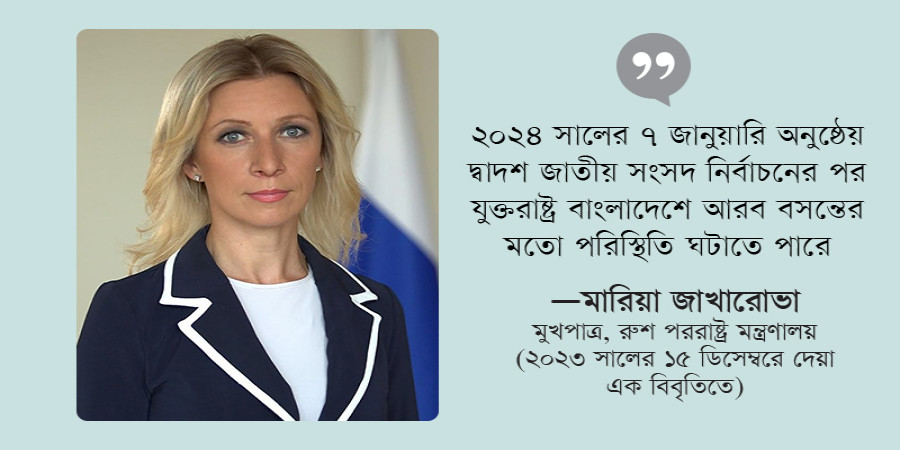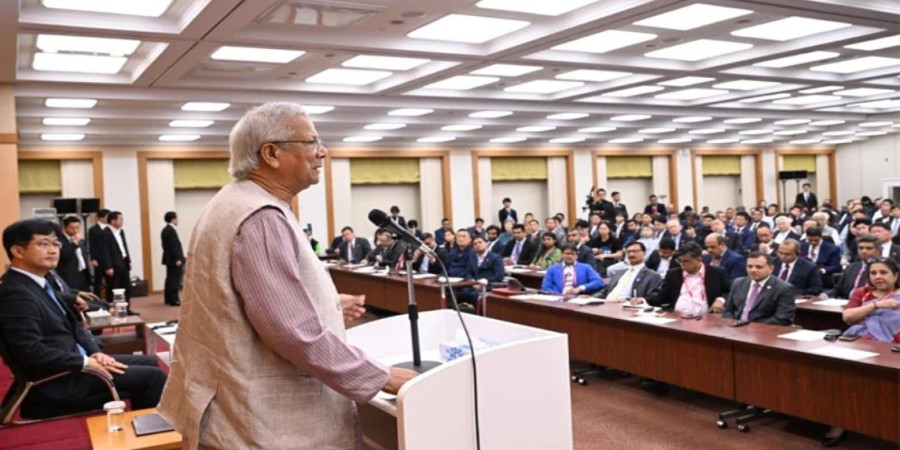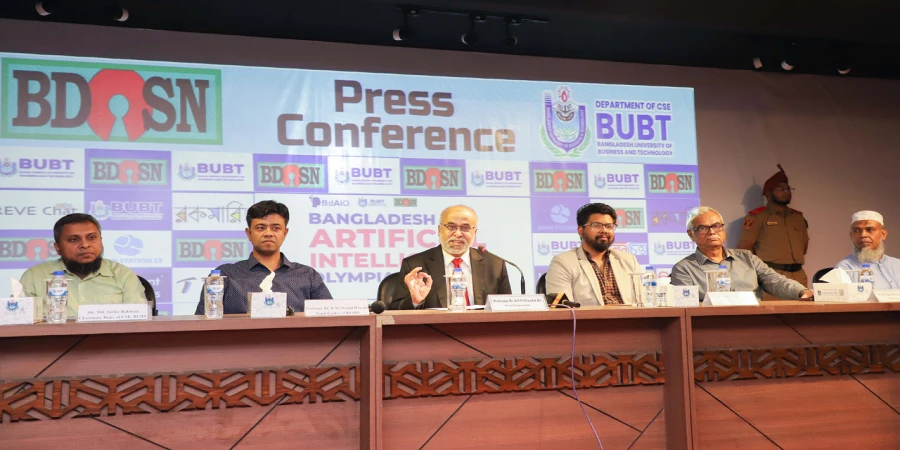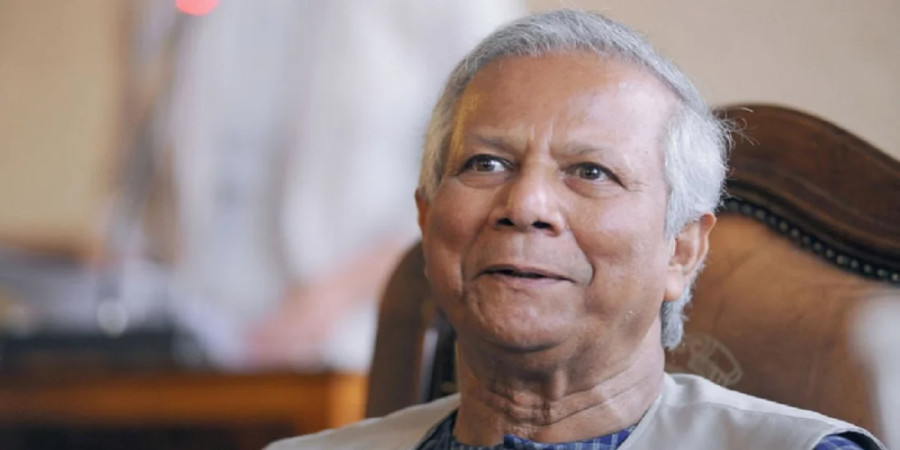
ছবি: Photo: Collected
On December 15, 2023, the Russian Foreign Ministry issued a warning regarding Bangladesh's upcoming national elections, expressing concerns that the United States might attempt to incite a situation similar to the Arab Spring following the January 7, 2024, parliamentary elections. Russian Foreign Ministry spokeswoman Maria Zakharova, in her statement from Moscow, stated that protests in Bangladesh in December had already led to road blockages, bus burnings, and clashes with police. She suggested these actions were influenced by Western diplomatic missions, particularly the U.S. Ambassador to Bangladesh, Peter Haas.
Zakharova accused the government of Prime Minister Sheikh Hasina of being "unwelcome" in the West and noted that further sanctions could be imposed against the Bangladesh government. She warned that these sanctions could extend to vital industries and possibly target government officials, accusing them of impeding the free expression of voters during the January elections. The Russian official suggested that if the U.S. was dissatisfied with the election results, it might try to destabilize the country, leading to a situation akin to the Arab Spring.
This was not the first time Russia had commented on Bangladesh’s internal political dynamics. The Russian Foreign Ministry had previously criticized the U.S. involvement in the country, especially regarding the activities of Ambassador Peter Haas, labeling them as gross interference in Bangladesh's internal affairs. However, Sheikh Hasina's government appeared to dismiss Russia's warning. In a press conference following Zakharova's remarks, then-Foreign Minister Dr. A.K. Abdul Momen stated that Russia's views were not relevant to Bangladesh's internal matters, further indicating that the government did not take the warning seriously.
According to Dr. Shamsuddin Ahmed, Vice President of the Soviet Alumni Association of Bangladesh (SAAB), the government's lack of response to Russia's statement was clear from the remarks of the Foreign Minister. The government had shown little interest in Russia’s concerns, which became apparent when Dr. Momen refused to engage in a discussion on the issue.
Months later, on August 5, 2024, a mass uprising led to the fall of Sheikh Hasina's government. The ruling party's response to demands for fair treatment in a student-led movement calling for quota reforms sparked widespread protests, which were brutally suppressed. This crackdown on student protests ultimately led to the government's downfall, and Sheikh Hasina was forced to flee to India, with an arrest warrant issued against her for alleged involvement in mass killings.
Political analysts suggest that Sheikh Hasina's government, in its excessive confidence, underestimated the growing discontent within the country. Observers believe that Hasina’s government relied too heavily on state machinery to maintain control over internal crises and dismissed external warnings, such as those from Russia. This overconfidence mirrors that of her father, Sheikh Mujibur Rahman, before the assassination of the founding father of Bangladesh in 1975, when he also failed to heed internal warnings and external advice.
Dr. Farid Uddin Ahmed, a professor in the Department of Political Science at Dhaka University, argues that the government's failure to address the demands of the protesters was a critical factor in its downfall. He believes that Russia's warnings went unheeded because the government was focused on maintaining its authority rather than engaging with the growing grievances of the people.
Former Ambassador M. Humayun Kabir points to internal factors as the primary cause of the political turmoil in Bangladesh. He emphasizes that the mass protests and subsequent downfall of Sheikh Hasina’s government were driven by domestic dissatisfaction rather than external interference. Kabir argues that external parties, including India and the U.S., were not in a position to influence the situation, as the protests were entirely homegrown, with no foreign agenda involved.
The situation regarding Russia's relations with Sheikh Hasina and her family has recently become a subject of intense international scrutiny. Investigations by Bangladesh's Anti-Corruption Commission (ACC) have begun into allegations of corruption linked to the construction of the Rooppur Nuclear Power Plant, one of the largest and most expensive infrastructure projects in the country’s history. Accusations have been made that Sheikh Hasina and her family members took substantial kickbacks from the project. The involvement of her niece, Tulip Siddiq, a member of the British Labour Party and a prominent figure in the UK's political landscape, has drawn further attention, with her being questioned in the UK as part of an ongoing inquiry.
The Rooppur Nuclear Power Plant project has been heavily criticized for its enormous cost, which has added significantly to Bangladesh's foreign debt burden. Economists have raised concerns about the long-term impact of the project on the country’s economy, particularly its ability to service its mounting debt. Critics argue that the high costs of the project could prove unsustainable for Bangladesh in the future, placing further strain on the nation’s fiscal stability.
Dr. Delwar Hossain, a professor in the Department of International Relations at Dhaka University, believes that Russia’s warning was more related to its geopolitical interests rather than a genuine concern for Bangladesh’s political stability. Hossain suggests that Russia’s increased friction with the U.S. over issues such as the war in Ukraine has led it to adopt a more aggressive stance in international diplomacy, attempting to sow discord in regions where the U.S. holds influence. He asserts that Russia’s comments about Bangladesh were more about stoking fears and asserting its influence over the region rather than reflecting any deep understanding of the local political landscape.
Hossain also notes that Russia’s commentary, particularly in the context of the U.S.-Russia rivalry, may have been aimed at discrediting Western influence in Bangladesh, with the hope of increasing its own political leverage. In contrast, he believes that India, despite its regional interests, could not play a decisive role in the unfolding events, as the situation was primarily driven by domestic factors.
Tensions between the U.S. and Russia over Bangladesh have been evident for some time. In late November 2023, the Russian Foreign Ministry issued another statement accusing U.S. diplomats, particularly Ambassador Peter Haas, of attempting to interfere in Bangladesh’s internal politics. In response, U.S. officials dismissed the accusations, with National Security Council Strategic Communications Coordinator John Kirby labeling the Russian claims as "classic Russian propaganda."
This diplomatic back-and-forth highlights the growing geopolitical divide over Bangladesh, as both the U.S. and Russia seek to extend their influence in the country, especially in light of the upcoming elections and political developments. The situation remains fluid, with the future of Sheikh Hasina’s government hanging in the balance and external powers closely monitoring the evolving crisis.
repoter






